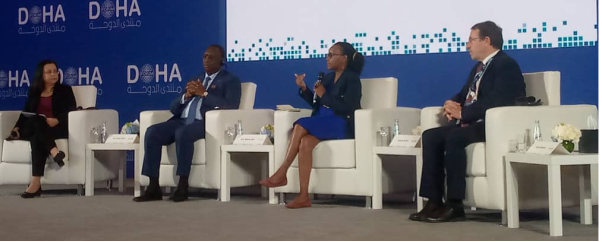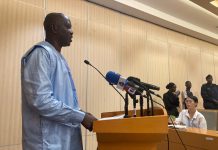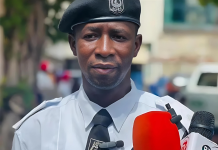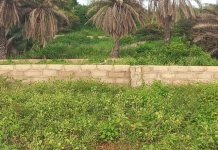AS SASASNET SG CALLS FOR INVESTMENTS IN SKILLS DEVELOPMENT
Every year, the State of Qatar convenes the Doha Forum for policymakers, government leaders, private sector representatives, civil society and non-governmental organisations around the globe to discuss how to address collective challenges facing the world.
This is the 21st Doha Forumbeing convened under the auspices of His Highness Sheikh Tamim bin Hamad Al-Thani, Amir of the State of Qatar, and held from 10th – 11th December 2023, in Doha, Qatar.
Hon. Ousman Sillah, Secretary General of the Sub-Saharan Africa Skills and Apprenticeship Stakeholders Network (SASASNET) and Chairperson pf Crab Island TVET Foundation, who was invited through the Qatari Embassy in The Gambiaon the basis of his renowned leadership, participated in the discussions during the two-day international convergence.
The SASASNET Secretary General made an intervention during one of the parallel sessions on the topic ‘Inclusive Economic Systems for Sustainable Growth’, where the panelists were His Excellency Macky Sall, President of Senegal, Mr. Achim Steinar, Administrator of the UNDP, Ms. Juliana Rotich, Head of FinTech Safaricom, Kenya, and Dr. Anita Zaidi (Moderator), President, Gender Equality Division, Bill and Melinda Gates Foundation.
“I wish to thank the panelists and moderator for their instructive and valuable presentations on this very important topic. I also wish to note one missing but very important issue which is not a topic in any of the sessions during these two days of discussions and this is ‘Irregular Migration’. All the topics are important but the issue of irregular migration is a real challenge to countries in our part of the world and President Sall can bear me witness as the country I come from, The Gambia, and Senegal are really contending with this reality.,” said Secretary General Sillah.
The SASASNET SG added “part of the solution to this challenge is for our governments to invest in the skilling, reskilling and upskilling of the young people and workforce of Africa.”
“Even considering the topic ‘Inclusive Economic System for Sustainable Growth’ which some of the presenters have elaborated on from the gender perspective, you will see that most of the women who are economically active are engaged in the informal sector without the required technical skills and support and which needs to be addressed,” noted Hon. Sillah.
He emphasised the fact that the majority of the workforce in Sub-Saharan Africa is in the informal sector and need to be upgraded to formal systems and standards through qualification and certification.
Hon. Sillah said it is in response to this challenge that they came together to form the newly established continental organisation called the Sub-Saharan Skills and Apprenticeship Stakeholders Network (SASASNET) which is headquartered in Nigeria. He said SASASNET is urging governments to invest in the skilling of Africa for the development of our countries and the continent and for the excess skilled labour to be exported.
The SASASNET SG also called on development partners to come up with debt relief arrangements where they will ask the governments to invest the funds saved from debt servicing in skills and apprenticeship development.
“This is what I wanted to share and President Sall knows that the Gambia and Senegal are having a challenge with this migration issue and the challenge is that our young people are not skilled. Europe needs skill workers and how do we take advantage of this,” concluded the SG of SASASNET.
In response, President Sall said “I want to agree with the speaker from the Gambia and to say that we are trying to do our best. You know Africa is dealing with very urgent emergencies in all areas. For example, Senegal is putting 25.6 percent of the budget on education and vocational training. Because if we don’t give education to our population, we cannot develop in Africa, particularly for our women and children. But education needs also a new paradigm shift.”
The Senegalese President said the education system that was in place after colonisation was to provide general education without any specific training on skills. He noted that today they are also trying to provide professional training to ten percent of children coming from the primary education schools to pursue up to university level to produce the technicians, engineers, etc.
“I agree that we have to challenge the human capital issue to promote sustainable development….So I agree with you that education is a worthy investment, although it costs a lot of money, and in Senegal, its three times more than the defence budget,” concluded President Sall.
During the course of the two days dialogue, the Doha Forum, dubbed as a global platform for dialogue, brought together renowned leaders in policy todiscussecritical challenges facing the world and built innovative and action-drivennetworks.
H.E. Sheikh Mohammed bin Abdulrahman bin Jassim Al Thani, Prime Minister of the State of Qatar and Minister of Foreign Affairs, gives the welcome remarks at the opening ceremony graced by His Highness Sheikh Tamim bin Hamad Al-Thani, Amir of the State of Qatar.
Under the banner ‘Diplomacy, Dialogue, Diversity’, the Forum featured renowned leaders, speakers and panelists who delivered keynote speeches at plenary and presentations in panel sessions that generate the interchange of ideas that seek for action-oriented recommendations.
Key among the issues that were discussed are the recent Israeli onslaught on the Palestinian territories of Gaza and West Bank and the reticent and double standard response or approach of the international community which Mr. Antonio Guterez, the United Nation Secretary General, highlighted in his speech during the opening.
Following the first plenary session on the main theme ‘Building Shared Futures’, the panel discussions were held on many pertinent topics, including BRICS & Multipolar International Order, Innovative Solutions for Governing AI & Emerging Cybertechnology, Reimagining Financial Markets for Humanitarian Impact: The Role of Small States & Private Sector Partnerships, Inclusive Economic Systems for Sustainable Growth, Breaking Barriers with Behavioral Science: Building Resilient Communities and Promoting Social Inclusion, AI as a Disruptive Panacea – Mitigating Risks and Realizing Opportunities, Towards a Multilayered World: Rethinking Alliances, Advancing Sustainability & Improving Governance in Fragile States, Reinvigorating Peacebuilding: Optimizing Regional Solutions and Revitalizing Global Engagement and Policies Today for a Cohesive Tomorrow, among others.
The other participants from the Gambia, who attended the Doha Forum 2023, included Dr. Cernu Omat Bari, Vice Chancellor International Open University, Mr. Alhaji Fadera, Central Bank of The Gambia, Mr. Momodou Sabally, former Secretary General and Minster of Presidential Affairs, and Mr. Ousman Touray, Youth Activist.
The Government of The Gambia was fully represented by HE Foday Malang, Ambassador of the Republic of The Gambia to the Kingdom of Qatar, and the Embassy staff comprising Mr. Yankuba Ceesay, Deputy Head of Mission/Deputy Ambassador, Mr. Musa Alieu Bah, Counsellor of the Embassy, and Mr. Alieu Manjang, First Secretary.




















